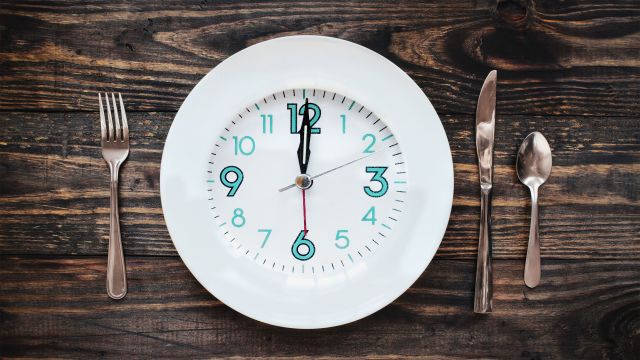Updated on January 12, 2024.
Diet trends come and go. Few of them stay popular for long, and even fewer are real keepers—healthy, sustainable eating plans designed to help you with weight management and promote good health. In that latter sense, intermittent fasting (IF) has potential.
During IF, you either voluntarily stop or greatly limit eating and drinking for set periods. There are no special meals or work-intensive prep—you just avoid food at certain times. Devotees often find that IF takes unwanted excess weight off quickly while revving energy.
But, as scientists increasingly suspect, there could be other advantages of IF. Some early studies, mostly on animals, suggest that IF may offer a range of health benefits, including a lower risk of many chronic diseases. More research is needed, though, to confirm these findings.
If you’re going to try IF, you should follow certain rules, says Ahmet Ergin, MD, an endocrinologist at St. Lucie Medical Center in Port St. Lucie, Florida. He says if you do it right, it may improve your wellbeing, but “if you do not, it may actually harm you.”
Here’s what we know about IF—what it is and how it affects your body, along with tips to consider if you choose to try it.
Your body on intermittent fasting
Fasting isn’t new. Humans have been doing it for ages, often as part of cultural celebrations or religious observances, such as the Muslim holy month of Ramadan. We also fast for medical reasons before certain tests and procedures.
While different types of fasting have different rules, intermittent fasts typically follow the same basic principles: Restrict your calorie intake during some periods and eat normally at other times. Like any diet, this decreases your overall calorie count—but it promotes weight loss in another way, too.
Here’s how it works: Whenever you eat, you get energy from the glucose (sugar) in your food. Insulin, the hormone produced in the pancreas, helps deliver glucose to your body’s cells. There, glucose is either used immediately for energy or stockpiled to access later.
“When you do not ingest carbohydrates or any sort of energy, your body immediately reduces insulin production,” says Dr. Ergin. If your insulin levels drop far enough, after several hours without carbohydrate ingestion, your body uses the stored glucose in your cells for energy. Once those are gone, it starts feasting on fat. In addition, a reduced carbohydrate intake and reduced insulin levels may help reduce insulin resistance—which is a precursor to diabetes.
Many people do drop pounds on IF, at least at first. The typical weight loss, however, may be fairly minimal. And as with all diets, the weight tends to come back once the diet is over.
Popular types of IF
There’s no single way to do IF, and it’s not certain that any method is more effective than another for short-term weight loss. That said, many people choose one of these approaches, or some variation of them:
- Time-restricted diet: You fast for a large chunk of the 24-hour day, but eat as you usually do during a specific block of time, such as 10 a.m. to 4 p.m. Since we naturally fast when we sleep at night, prolonging those hours is an easy way to accomplish this.
- 5:2 diet: This plan typically involves limiting yourself to, say, 500 calories two days per week. The other five days, you eat like you normally would or eat normally within a certain time window. The low-calorie days are spread out, so you’re never fasting two days in a row.
- Alternate-day fast: You switch up no- or low-calorie days with regular eating days.
Those interested in IF should know: Long periods of deprivation could make it harder to stick to IF than other diets. Though some people find IF tolerable, a 2017 study published in JAMA Internal Medicine found a dropout rate as high as 38 percent.
There’s also concern people may overeat when a fasting period ends. That’s not healthy, Ergin says, “and you are basically negating all the benefits you have collected by fasting.”
Finally—and perhaps most significantly—research hasn’t shown that IF is better for weight loss than other calorie restriction eating plans. In studies, people tend to lose the same amount of weight on either type of diet. For example, the results of a randomized controlled trial published in 2023 in Annals of Internal Medicine showed that participants on IF lost an average of about 12 pounds in 12 months. People who simply restricted calories dropped around 10 pounds over the same period.
How IF may improve your health
Some experts believe IF could boost health in multiple ways, but research on humans is early and limited. Most studies on the health effects of IF have so far focused on animals.
What’s more, it’s often unclear how much benefit comes from IF’s effects on body chemistry versus how much comes from weight loss. In general, there isn’t much evidence that IF is better for your health than other weight-loss plans.
That said, IF may help the following:
- Your heart: Some studies show that doing IF regularly may improve certain heart disease risk factors. Ergin says you could see “significant improvements” in cholesterol, triglycerides, blood pressure, and inflammation levels.
- Your brain: Based on animal data, some researchers suspect IF could boost memory and safeguard against degenerative conditions like Alzheimer’s and Parkinson’s disease.
- Your liver: Drawing again from studies on animals, some experts believe IF may help reduce the odds of nonalcoholic fatty liver disease, a serious issue that may lead to scarring (cirrhosis) and eventually liver cancer or liver failure.
- Your insulin sensitivity: Prediabetes and type 2 diabetes occur in individuals who have a low sensitivity to insulin—that is, people who are insulin resistant. Intermittent fasting may increase that sensitivity.
- Your cancer risk: Currently, there are no data on the effects of IF on cancer rates in humans, and more research is needed. Some early studies on rats and mice, however, suggest IF may be associated with fewer cancers of certain types in those animals.
Intermittent fasting tips, tricks—and warnings
Speak with a healthcare provider (HCP) before starting IF. They can help you decide whether IF is the right plan for you and give you a heads-up about potential pitfalls and health hazards. Let your HCP know if you’re on medications as well, since IF can affect them.
If you try IF, experts recommend starting slowly and working your way up to longer periods without food. Some people may experience side effects like headaches, lightheadedness, or mood changes at first, but fans claim they should disappear as you get used to it.
Remember to stay hydrated during your fast, Ergin says, since people who eliminate meals may neglect drinking water: “That can lead to dehydration and kidney problems, especially in patients already having baseline kidney problems.”
Also, follow a nutritious eating plan at times you aren’t fasting. Emphasize wholesome foods like produce, lean protein, legumes, whole grains, and healthy fats. Try to avoid binging on junk food when a fasting period ends.
Be aware: Though IF is likely safe for most of us in the short term, skipping meals and slashing calorie intake can be harmful to some, including:
- Growing children and adolescents
- Pregnant or nursing women
- People with diabetes
- People who take medication requiring food
- People taking medication for heart disease or blood pressure
- People with a history of eating disorders
Finally, know that the long-term safety and effects of IF aren’t yet well understood. And, says Ergin, “No matter what diet you go on, if it’s short-term and it’s not maintained, it has no long-term benefits.” So if you attempt IF, do so with your eyes open—and an HCP by your side.







